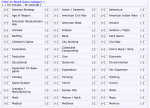G
Guest 6801328
Guest
When an interesting sounding RPG comes along, I struggle to get a sense of what the rules are like. Reading reviews I get a good sense for the genre and mood, but what I really want to know is where the rules are in terms of complexity and...well, I'm not really sure what the axes are. I think about the differences between (to grab a few random examples) systems like Dungeon World, various editions of D&D, MERP (!!!), Fantasy Flight Star Wars, and some others and although I have preferences I have trouble specifying how you would measure the differences.
What I'd LOVE is a 2D scatter plot, where games are placed (by consensus?) on two axes. I suspect one axis would be "complexity". What other axis would provide the most useful information? Maybe something about adherence to strict rules, versus narration/interpretation? Although I suspect that axis would correlate pretty strongly to general complexity.
Alternatively (or additionally) having two axes of "chargen complexity/options" and "gameplay complexity" might be interesting.
And then, in addition to numerical ratings, maybe there are some categorical tags that help explain what the rules/systems are like. But, again, I'm not sure what they are.
An analogy of what I'm looking for might be how we shop for cars (size, type, seating, engine, performance, etc.) or houses (price, zip code, style, # of rooms, etc.). Those axes don't give *all* information, but they help you narrow down your search.
What would the equivalent be for RPGs?
Thoughts?
What I'd LOVE is a 2D scatter plot, where games are placed (by consensus?) on two axes. I suspect one axis would be "complexity". What other axis would provide the most useful information? Maybe something about adherence to strict rules, versus narration/interpretation? Although I suspect that axis would correlate pretty strongly to general complexity.
Alternatively (or additionally) having two axes of "chargen complexity/options" and "gameplay complexity" might be interesting.
And then, in addition to numerical ratings, maybe there are some categorical tags that help explain what the rules/systems are like. But, again, I'm not sure what they are.
An analogy of what I'm looking for might be how we shop for cars (size, type, seating, engine, performance, etc.) or houses (price, zip code, style, # of rooms, etc.). Those axes don't give *all* information, but they help you narrow down your search.
What would the equivalent be for RPGs?
Thoughts?
















